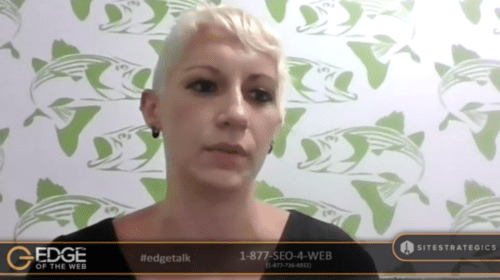When Site Strategics CEO Erin Sparks spoke with special guest Lily Ray, SEO Director at Path Interactive, during episode 315 of the award-winning EDGE of the Web podcast, the main topic was Google’s E-A-T standards for SEO. Here’s what we learned:
Lily Ray: Her Background and Experience
Lily Ray joined Path Interactive in 2018 as the Director of SEO, providing strategic leadership for the agency’s SEO client programs. Born into a family of software engineers, web developers, and technical writers, Lily brings a strong technical background, performance-driven habits, and forward-thinking creativity to all programs she oversees.
Lily began her SEO career in 2010 in a fast-paced start-up environment and moved quickly into the agency world, where she helped grow and establish an SEO department that delivered high impact work for a fast-growing list of notable clients, including Fortune 500 companies. Lily has worked across a variety of verticals with a focus on retail, e-commerce, b2b and CPG sites. In 2017, Lily was nominated by Search Engine Land for Female Search Marketer of the Year.
She oversees Path Interactive’s organic search programs and works with her team of 12 (and counting) SEO professionals in NYC and Nashville to develop the strategy and help with execution across all SEO programs. Lily is also a semi-professional DJ and drummer in her spare time.
Lily was studying politics at NYU and was planning on going into law when the Great Recession hit, but a lot of people on that track were not finding jobs. Lily found a paid internship doing social media marketing and SEO. It was little more than stuffing keywords into meta-descriptions for page after page after page. But it got results in terms of rankings and she was fascinated by looking at the analytics. She went on to do SEO work in-house at a couple of different places, then moved over to working for agencies as of seven years ago.
The Ever-Changing Landscape of SEO
Anyone who’s been doing SEO for enough years understands how it’s a journey where the tactics you get used to using at some point become obsolete, like the keyword stuffing of meta-descriptions Lily started out doing. Or when Google rolled out “not provided” in Analytics. All SEOs have to learn how to roll with the punches and come up with new strategies. But that’s also what keeps it fun for many.
Every time Google does a significant algorithm update, it feels like an earthquake. August 1, 2019, was a big one, as was September 27, 2019 (as a kind of after-shock to August 1), and even more recently was the March 12, 2019 update. For clients in the YMYL space, it’s never a dull moment when these updates take place. YMYL (Your Money or Your Life) are websites or individual web pages that can impact the future income, happiness, wellbeing, and safety of users.
The Rise of E-A-T
The whole E-A-T concept is not new. Google actually started talking about it in 2014, but now it’s playing a bigger role than ever, particularly for websites that fall into the YMYL category. All the platforms are under greater scrutiny these days, including Facebook and Twitter about the information being supplied to the public. Google is no different, so it wants to do everything it can to make sure the information it points people to is trustworthy, that it’s not misinformation, it’s not causing violence, or harm, or things like the recent vaccination scandal. Google is just really cracking down on controlling information to the fullest extent it can, so it can be seen as a trustworthy company.
What Google’s doing is figuring out a way for the algorithm to identify who these experts are, and how trustworthy these experts are. A lot of people ask me, “Oh, can’t you just kind of put someone’s name behind it, and then talk about how much they’re an expert,” and it could be an entirely fictitious person. No! Google’s been focusing on authorship for a number of years, through different mechanisms, in order to verify experts.
One such mechanism is machine-readable entities, which basically means there’s a number associated with different authors and entities on the internet. Google stores information about a person by the number, and when they reach a certain point of credibility, Google is matching that number or that machine-readable entity across different websites, and they’re seeing how this person wrote for The New York Times, and this person wrote for The Washington Post, and so they’re trusted as experts for their content throughout the internet. There’s a lot going on there.
The most recent update Google rolled out in its search quality guidelines a couple of weeks ago had a lot to do with E-A-T. It explained how sites that aren’t YMYL don’t need to focus so much on E-A-T. But there’s so much gray area around what is and isn’t YMYL. What about cars? Buying a car is a huge purchase related to the safety of you and your family. Diet and fitness are definitely YMYL, even though it’s not the same as writing about heart attacks and cancer, because it still absolutely affects your health and your wellbeing. A lot of sites fall into the YMYL category. It doesn’t just have to be strictly medical content.
Connect with Lily Ray, SEO Director at Path Interactive
Twitter: @lilyraynyc (https://twitter.com/lilyraynyc)
LinkedIn: https://www.linkedin.com/in/lily-ray-44755615/
Website: http://lilyray.nyc
Path Interactive: https://www.pathinteractive.com
PI Twitter: @PathInteractive (https://twitter.com/PathInteractive)
PI Facebook: @pathinteractive (https://www.facebook.com/pathinteractive/)
PI LinkedIn: https://www.linkedin.com/company/path-interactive/
The Truth About Your Digital Marketing ROI?
If you want to know your true digital marketing ROI, EDGE sponsor Site Strategics can help. We’ll assemble a Digital Marketing ROI Report that examines your existing SEO, content, social media, and PPC. Visit EDGE Nation online at https://edgeofthewebradio.com/roi/ to get 30% off a comprehensive review of your digital assets!


